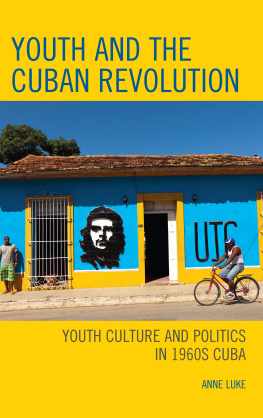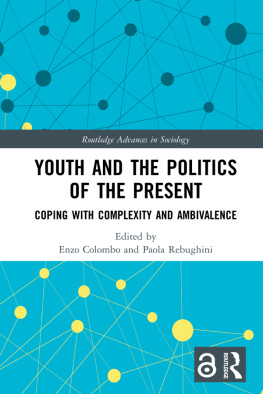COMMUNITIES OF YOUTH
Communities of Youth
Cultural practice and informal learning
STEVEN MILES, AXEL POHL, BARBARA STAUBER, ANDREAS WALTHER, RUI MANUEL BARGIELA BANHA AND MARIA DO CARMO GOMES
First published 2002 by Ashgate Publishing
Reissued 2018 by Routledge
2 Park Square, Milton Park, Abingdon, Oxon 0X14 4RN
711 Third Avenue, New York, NY 10017, USA
Routledge is an imprint of the Taylor & Francis Group, an informa business
Copyright Steven Miles, Axel Pohl, Barbara Stauber, Andreas Walther, Rui Manuel Bargiela Banha and Maria do Carmo Gomes 2002
The authors have asserted their moral rights to be identified as authors of this work in accordance with the Copyright, Designs and Patents Act, 1988.
All rights reserved. No part of this book may be reprinted or reproduced or utilised in any form or by any electronic, mechanical, or other means, now known or hereafter invented, including photocopying and recording, or in any information storage or retrieval system, without permission in writing from the publishers.
Notice:
Product or corporate names may be trademarks or registered trademarks, and are used only for identification and explanation without intent to infringe.
Publishers Note
The publisher has gone to great lengths to ensure the quality of this reprint but points out that some imperfections in the original copies may be apparent.
Disclaimer
The publisher has made every effort to trace copyright holders and welcomes correspondence from those they have been unable to contact.
A Library of Congress record exists under LC control number: 2002066705
ISBN 13: 978-1-138-73013-7 (hbk)
ISBN 13: 978-1-315-18832-4 (ebk)
Communities of Youth is concerned with addressing the challenges young women and men face as regards the changing nature of youth as a life stage. High youth unemployment rates and disengagement from post- compulsory education are just two examples of the structural changes young people are having to cope with in what has often been described as a risk society. Despite these changes Western countries continue to develop social policies based on a conception of youth as a relatively straightforward transitional phase in peoples lives. This book argues that the time has come to adopt a more radical approach to what and how young men and women learn and how learning relates to young peoples transitions. In this context, the book discusses the results of a comparative European research project which sought to link young peoples actual experience of youth training to the development of their lifestyles in community settings. Communities of Youth is particularly concerned with addressing the value of performing arts as a source for informal learning which encourages young people to find themselves and to develop a sense of self-belief that they cannot apparently achieve through more traditional training regimes.
Communities of Youth will provide academics and students in the fields of sociology, community work and education with a considered and theoretically informed examination of aspects of young peoples experience of training in an applied context. It will therefore be of particular interest to practitioners in the field of youth work and youth training.
We thank the European Commissions DG Education and Culture who funded parts of the research this book under their programme Youth for Europe. We are grateful to all the staff members at Hope Street Ltd. (Liverpool), Chapit (Lisbon), and Gemeinschaftszentrum Jungbusch (Mannheim) for sharing their time and their knowledge of young peoples lives with us. Above all, we wish to thank all the young women and men in Lisbon, in Liverpool and in Mannheim who gave us an insight into the creative and inventive nature of their transitions. It is thanks to them that the field work for this research was both an intellectually fruitful and a thoroughly enjoyable experience.
This book is concerned with the exploration of non-conventional means of empowering young people in their transitions to work and adulthood. Biographical transitions are normally related to status passages between different phases of the life-course. As such they refer to learning: the acquisition of knowledge and skills inherent to the demands of the life-phase to come. Institutionalized forms of organizing this kind of learning mainly focus on the skills and qualifications young people need. But equally important to the process of learning is the development of competencies necessary for coping with these demands in a subjectively meaningful and individually viable way. This issue represents a key focus of this book.
Recent research on transitional systems in Europe (EGRIS, 2001; Walther et al., 2002) has shown that the structures of formal education and training have failed in preparing a considerable percentage of young people appropriately for the demands associated with entering the labour market and constructing their own biographies in a way which makes sense for them. First, educational structures cannot avoid, and sometimes re-produce or even re-inforce, inequalities in the qualifications starting postions of young people. This means restricted options for individual choice and high risks of social exclusion for those with the lowest qualifications (Kieselbach et al., 2001). Secondly, many schools and training organizations obviously have lost touch with the needs of a changing economy and a changing workforce. They seem to be simply not in tune with changing labour market needs, with young peoples life plans nor with the requirements of coping with the everyday life of transitions which follow less and less linear and predictable routes. This dilemma is due to the constraints of the societal organization of learning in general, which, in one way or the other, puts a strong emphasis on selection. It is very difficult, if not impossible, to create a balance between the principles of selection and integration. Meanwhile, it is also true to say that economic and social demands alter so rapidly that it is equally difficult to foresee and plan learning needs in advance. In contrast, it has become obvious that formal education and training have ceased to be a reliable defence against unemployment and against increasingly precarious futures. Many young people find themselves in a situation in which they are forced to deal with the uncertainties caused by so-called flexible labour markets and globalized economies. In these circumstances the transition itself is undermined. It is certainly not the case that such young people are not capable enough to cope with the demands of a changing world. Rather, our suggestion here is that the skills and knowledge they are offered by mainstream education and training are not giving them the tools they need to survive and to prosper.
Many young people react to these circumstances by withdrawing from formal education and training. They therefore become labelled as disadvantaged, and any problems they have tend to be ascribed to individual deficiencies rather than to be regarded as deficiencies of the system as a whole. Young people therefore inevitably feel stigmatized and pressurized into lowering their aspirations towards those jobs and training schemes available to them, however inappropriate they may be. Feeling demotivated they do not expect any subjectively meaningful support from public institutions in general and from agencies such as vocational counselling, and the careers and employment services.







